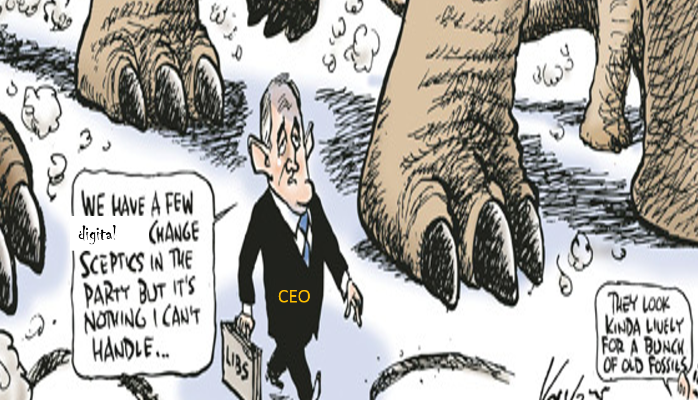
Disrupting boards
UK corporates – falling behind the Digital Innovation challenge
With more than 2 billion customers connected to social networks, 5 billion people carrying mobile phones, and 2.5 quintillion new pieces of data generated every day, it is clear that being digital is critical for corporate success. But if this data is not enough to sway you, then take a look at the Chinese market.
China’s e-commerce market overtook the U.S. in 2013 as the world’s largest online retail market. According to management consulting firm Bain & Company, online sales in China are expected to reach $540 billion by 2015, compared with roughly $345 billion in the U.S. So whether your firm is local or global, it’s time to acknowledge the hard truth: digital rules the customer, employee, and shareholder roosts! And that means that if you don’t have at least one digital corporate director on your board, you need him or her now.
WSJ recently published a piece entitled, “Companies Set Up Advisory Boards to Improve Digital Savvy”. In the US, it is estimated that approximately 50 companies in the Fortune 500 have already set up digital advisory panels. These include, among others, Target Corp., American Express, Pozen, Medtronic and General Electric. Government in the UK have invested heavily bringing experts from digital start-up world onto various Digital panels and advisory boards (Martha Lane Fox / Brian McBride / James Bilefield / Ashley Frieldland / Russell Buckley) all have successful track records of building digital companies pretty much from scratch and don’t fit the norm of corporate executives sitting on governance driven traditional boards. The Digital High Street Advisory Board has been established, yet corporate UK lags behind.
There are a few exceptions in the UK, Thomas Cook formed a DAB under their then new CEO, Harriet Green engaging with those from outside of corporate world. On formation Harriet Green was quoted as saying:
 ‘A vital element in our transformation is the development and implementation of our digital strategy.….The DAB will make a significant contribution to the success of Thomas Cook. It, in addition to the Group’s executive team, includes an exceptional array of independent experts whose input will be invaluable to our activities……..The twelve members (6 external) of the DAB bring a unique combination of experience in digital marketing, online retail, search engine optimisation, mobile solutions, interactive communities, and social media.
‘A vital element in our transformation is the development and implementation of our digital strategy.….The DAB will make a significant contribution to the success of Thomas Cook. It, in addition to the Group’s executive team, includes an exceptional array of independent experts whose input will be invaluable to our activities……..The twelve members (6 external) of the DAB bring a unique combination of experience in digital marketing, online retail, search engine optimisation, mobile solutions, interactive communities, and social media.
She was right, with the group winning 9 digital awards in 2014 across Europe, introducing Oculus Rift head set experiences into selected the retail outlets, developing Wishlist (winner of TTG Leading edge of innovation award 2014). Their investment in digital underpinned their turnaround.
In the UK we have over 64 Chief Digital Officers (23% in Agency / 14% media owners / 12% FS) but very few have experience from digital high growth world. So whilst technically well experienced, they lack the insight and authority to turn digital advancement into real operational, product and commercial innovation. There are exceptions such as Sean Cornwell at Travelex, ex Google, eHarmony & Shuttl. But on the whole they lack the ability to change company policy and behaviour at board level and have to worry about keeping their jobs and what’s next. In the US there are over 850 CDOs, yet still the trend is emerging to invest in Digital Advisory Boards. So why?
The key is in the ability of organizations to take digital out of the technology or marketing box and put it at the core of how to better serve customers, consumers and suppliers through new products and services.
 These panels / boards have no sacred cows, they have no fear of losing their job or managing tricky internal stakeholders, they can be free of traditional norms of corporate behaviour (within reason!). They can engage internally and externally with like-minded entrepreneurs to delivery MVPs through being truly agile. They bring the most valuable commodity of all, external expertise, networks and experience in not just talking digital but making it happen. They often come through very different backgrounds than typical strategic advisers, they’ve run and built digital business and know how to build digital products and services. Typically their success has been built by breaking rules, not conforming but the best have the emotional intelligence to persuade and influence.
These panels / boards have no sacred cows, they have no fear of losing their job or managing tricky internal stakeholders, they can be free of traditional norms of corporate behaviour (within reason!). They can engage internally and externally with like-minded entrepreneurs to delivery MVPs through being truly agile. They bring the most valuable commodity of all, external expertise, networks and experience in not just talking digital but making it happen. They often come through very different backgrounds than typical strategic advisers, they’ve run and built digital business and know how to build digital products and services. Typically their success has been built by breaking rules, not conforming but the best have the emotional intelligence to persuade and influence.
If UK corporates want to keep up with the potential technology provides they need to have challenge at board level, that translates into operational and commercial influence and change.

No Comments